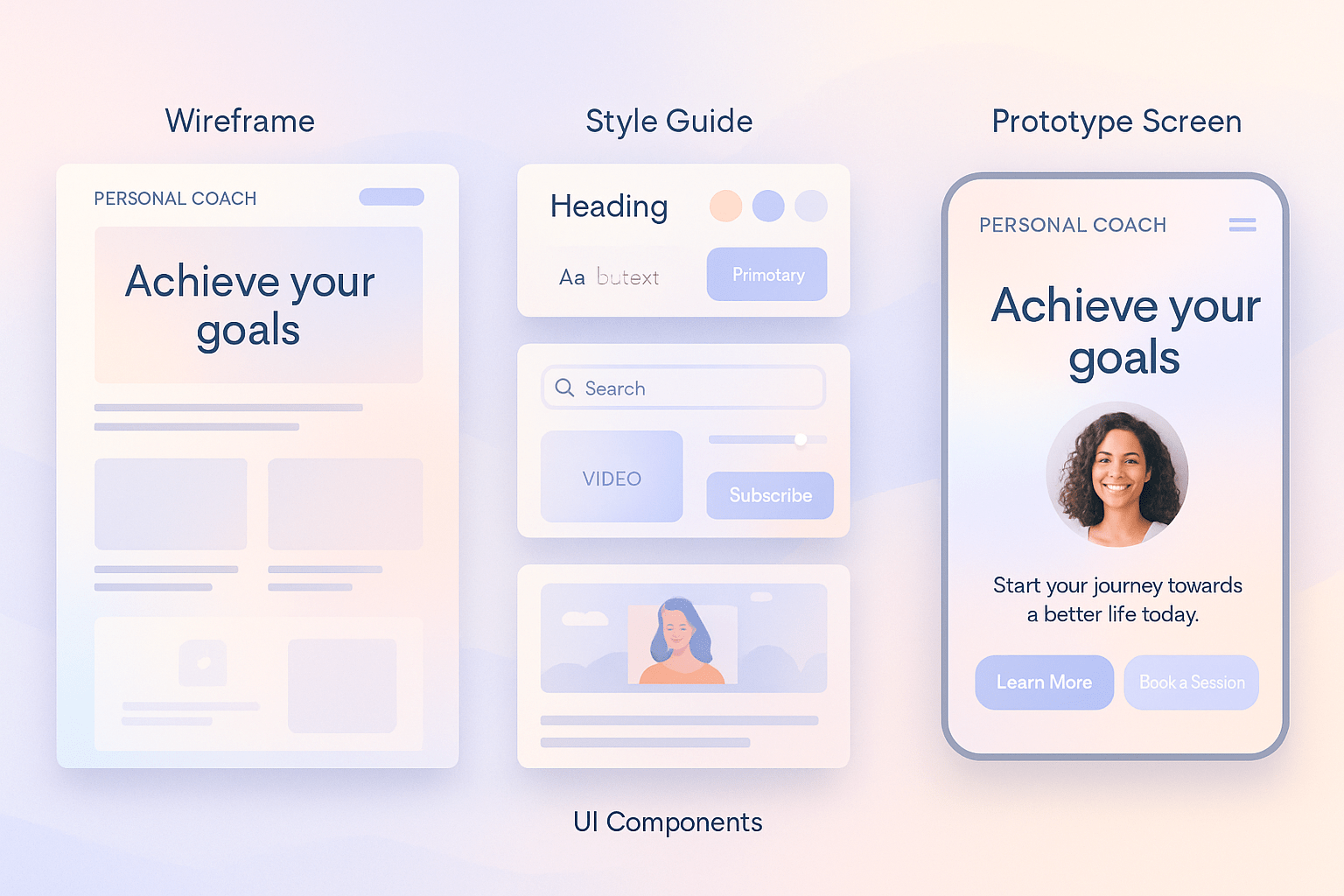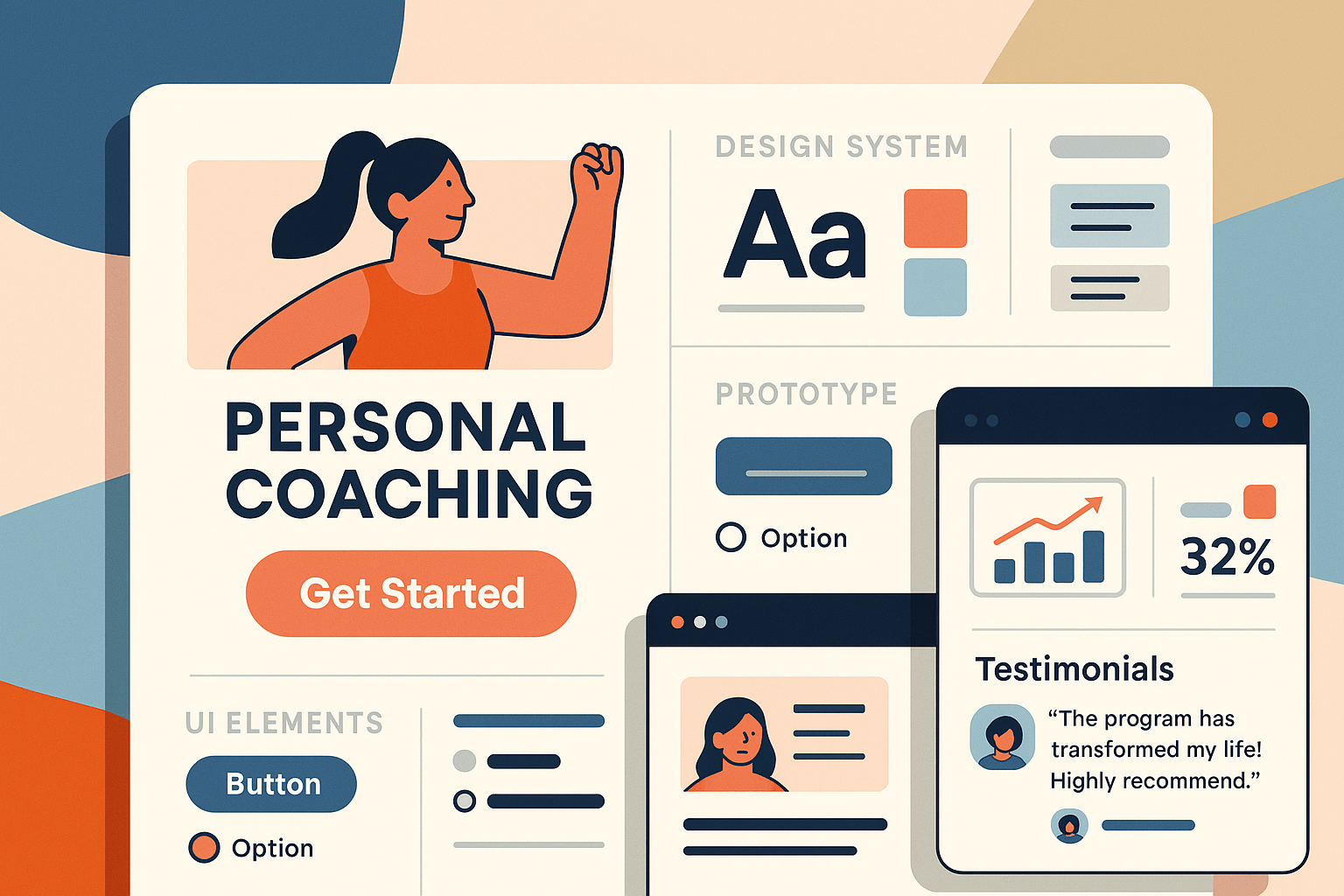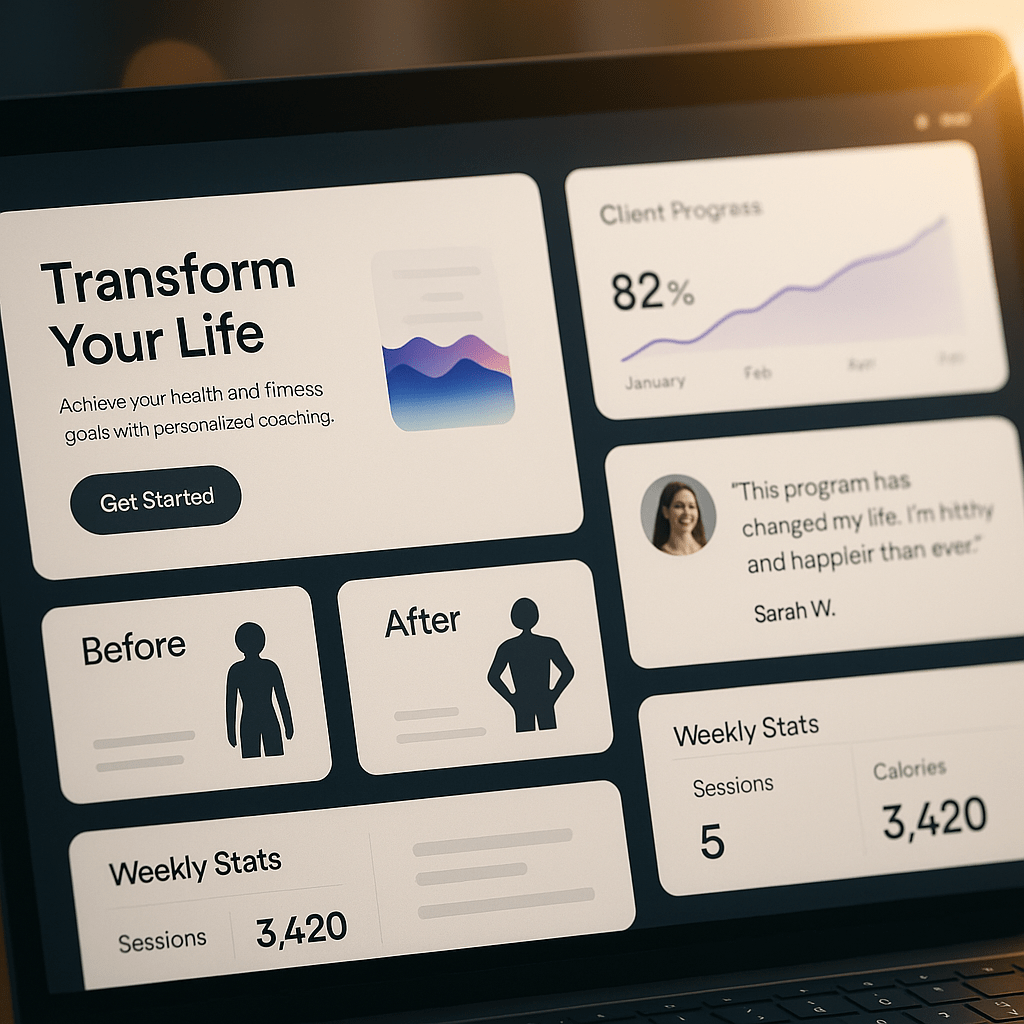The Future of Web Design in Personal Coaches
by Design Delulu Editorial · September 19, 2025

In today's digital-first world, personal coaches face unprecedented challenges in reaching and retaining clients. While traditional coaching methods remain valuable, the landscape has shifted dramatically toward online presence and digital engagement. Personal coaches who embrace strategic web design aren't just keeping up with trends—they're positioning themselves for sustained success in an increasingly competitive market.
The coaching industry has experienced explosive growth, with millions of professionals offering services ranging from life coaching to fitness training and business mentoring. However, this growth has also intensified competition, making it crucial for coaches to differentiate themselves through professional, user-friendly websites that convert visitors into paying clients.

Why Personal Coaches Need Web Design
Key Challenges Personal Coaches Face
Personal coaches encounter several critical obstacles that effective web design can address:
- Client Acquisition Difficulties: Many coaches struggle to attract new clients consistently. Without a professional online presence, potential clients have no way to discover your services or understand your unique value proposition. A well-designed website serves as your 24/7 marketing tool, working to attract and convert prospects even when you're not actively promoting your services.
- Credibility and Trust Issues: In an industry where personal transformation is promised, trust becomes paramount. Clients need to feel confident in your expertise before investing in coaching services. A professional website establishes credibility through testimonials, case studies, professional photography, and clear communication of your qualifications and methodology.
- Inefficient Client Management: Without proper systems, coaches often find themselves drowning in administrative tasks—scheduling sessions, processing payments, sending follow-ups, and managing client communications. This administrative burden reduces time available for actual coaching and limits growth potential.
- Limited Scalability: Many coaches hit a ceiling where they can't take on more one-on-one clients without burning out. Web design enables the creation of digital products, online courses, and automated systems that allow coaches to serve more people without proportionally increasing their time investment.
How Web Design Solves These Problems
Strategic web design addresses these challenges through several mechanisms:
- Enhanced Visibility: SEO-optimized websites help coaches rank higher in search results when potential clients look for coaching services. This organic visibility reduces dependence on paid advertising and creates a sustainable source of new leads.
- Professional Credibility: A well-designed website immediately communicates professionalism and expertise. High-quality design, clear messaging, and strategic content placement help visitors quickly understand your value and feel confident in your abilities.
- Streamlined Operations: Modern websites can integrate with scheduling software, payment processors, and client management systems, automating many administrative tasks that previously required manual attention.
- Scalable Revenue Streams: Web design enables coaches to create multiple income streams through digital products, online courses, membership sites, and automated coaching programs.

Essential Features of Web Design for Personal Coaches
Must-Have Tools and Design Elements
- Clear Value Proposition: Your homepage should immediately communicate what you do, who you serve, and the transformation you provide. Visitors should understand your unique approach within seconds of landing on your site.
- Professional Photography: High-quality, authentic photos of you working with clients help build trust and connection. Avoid generic stock photos in favor of professional images that showcase your personality and coaching style.
- Client Testimonials and Case Studies: Social proof remains one of the most powerful conversion tools. Feature detailed success stories, before-and-after transformations, and specific results your clients have achieved.
- Online Scheduling Integration: Tools like Calendly, Acuity, or similar platforms should be seamlessly integrated into your website, allowing potential clients to book discovery calls or sessions without friction.
- Lead Magnets and Content Marketing: Offer valuable free resources—eBooks, assessment tools, mini-courses—that demonstrate your expertise while capturing visitor contact information for follow-up marketing.
- Mobile-Responsive Design: With increasing mobile usage, your website must function flawlessly across all devices. Mobile optimization also impacts search engine rankings significantly.
- Clear Navigation and User Experience: Visitors should be able to find information about your services, pricing, and contact details within a few clicks. Confusing navigation leads to immediate bounce rates.
Real-World Implementation Examples
Successful coaching websites often feature dedicated service pages for each coaching offering, detailed "About" sections that tell your story and build connection, and clear pricing information that eliminates confusion and positions your services appropriately in the market.
Integration with email marketing platforms enables automated follow-up sequences that nurture leads over time, while blog sections provide ongoing value and improve search engine optimization.

Common Mistakes to Avoid
Typical Pitfalls in Web Design for Personal Coaches
- Overcomplicating the Message: Many coaches try to serve everyone and end up connecting with no one. Attempting to be a life coach, business coach, and fitness trainer simultaneously dilutes your message and confuses potential clients about your primary expertise.
- Neglecting Local SEO: Personal coaches often serve local markets but fail to optimize for location-based searches. Missing location-specific keywords and Google My Business optimization limits local visibility.
- Hiding Pricing Information: While some coaches prefer to discuss pricing during consultations, completely hiding pricing information can increase bounce rates. Consider providing price ranges or package options to qualify leads effectively.
- Poor Content Strategy: Publishing sporadic, unfocused blog posts doesn't provide SEO benefits or establish expertise. Consistent, valuable content addressing your target audience's specific challenges performs much better.
- Inadequate Social Proof: Featuring only first names or generic testimonials reduces credibility. Whenever possible, include full names, photos, and specific results to maximize social proof impact.
How to Do Better
Focus on a specific niche and ideal client persona. Develop clear messaging that speaks directly to their challenges and desired outcomes. Invest in professional photography and branding that reflects your personality and approach.
Create a content calendar addressing common client questions and challenges. This content serves double duty—providing value to visitors while improving search engine rankings for relevant keywords.
Implement conversion tracking to understand which website elements drive inquiries and bookings. Use this data to continuously optimize your site's performance.
SEO and Growth Best Practices
Optimization Tips Specific to Personal Coaches
- Keyword Research and Implementation: Target long-tail keywords that reflect how potential clients search for coaching services. Instead of competing for "life coach," target phrases like "career transition coach for women over 40" or "business coach for creative entrepreneurs."
- Local Search Optimization: Include location-based keywords throughout your content, create location-specific service pages, and maintain accurate Google My Business information with regular posts and client reviews.
- Content Marketing Strategy: Develop pillar content around major coaching topics, then create supporting articles that link back to these comprehensive resources. This internal linking strategy helps search engines understand your expertise areas.
- Page Speed and Technical SEO: Ensure fast loading times, proper heading structure, and optimized images. Technical issues can significantly impact both user experience and search rankings.
- Schema Markup Implementation: Use structured data to help search engines understand your business type, services, and client reviews, potentially earning rich snippets in search results.
Leveraging Web Design for Visibility and Results
- Conversion Rate Optimization: Continuously test different call-to-action buttons, form placements, and page layouts to improve the percentage of visitors who become leads or clients.
- Analytics and Performance Tracking: Implement comprehensive tracking to understand visitor behavior, popular content, and conversion paths. This data informs ongoing optimization efforts.
- Email List Building: Design your website to capture email addresses through valuable lead magnets, then nurture these relationships through consistent, helpful email content.
- Social Media Integration: While not replacing your website, social media should drive traffic back to your site where conversion opportunities are optimized.
The future of personal coaching lies in combining proven coaching methodologies with strategic digital presence. Coaches who invest in professional web design create sustainable competitive advantages through improved visibility, enhanced credibility, and streamlined operations.
Your website should work as your most dedicated team member—attracting prospects, building trust, and converting visitors into clients while you focus on what you do best: transforming lives through coaching.
Ready to transform your coaching practice with strategic web design? The investment in professional website development pays dividends through increased client acquisition, improved operational efficiency, and enhanced professional credibility.
Additional Resources for Personal Coaches
Essential Tools and Platforms
Website Builders and CMS Platforms:
- WordPress: Most flexible for SEO and customization, ideal for content-heavy coaching sites
- Squarespace: User-friendly with beautiful templates, perfect for coaches who want professional design without technical complexity
- Webflow: Advanced design control with visual development, excellent for coaches who want unique, custom layouts
Scheduling and Client Management:
- Calendly: Simple appointment scheduling with automated reminders and timezone detection
- Acuity Scheduling: Advanced booking features including intake forms and payment processing
- Practice Better: Comprehensive client management specifically designed for health and wellness coaches
- CoachAccountable: All-in-one platform for goal tracking, session notes, and client progress monitoring
Email Marketing and Automation:
- ConvertKit: Designed for creators and coaches with advanced tagging and segmentation
- Mailchimp: User-friendly with strong automation features and detailed analytics
- ActiveCampaign: Powerful automation workflows perfect for nurturing coaching leads
Payment Processing:
- Stripe: Flexible payment processing with subscription and one-time payment options
- PayPal: Widely trusted payment platform with easy integration options
- Square: Comprehensive payment solutions including in-person and online transactions
Industry-Specific Resources
Coaching Certification Bodies:
- International Coach Federation (ICF) - Global coaching standards and certification
- Center for Executive Coaching - Leadership and executive coaching specialization
- Institute for Professional Excellence in Coaching (iPEC) - Energy leadership coaching methodology
Legal and Business Resources:
- LegalZoom: Business formation and legal document templates
- Nolo: Legal guides specifically for service-based businesses
- SCORE: Free mentorship for small business owners and coaches
Content Creation Tools:
- Canva: Easy graphic design for social media, lead magnets, and marketing materials
- Unsplash/Pexels: High-quality free stock photography
- Grammarly: Writing assistance for blog posts and marketing copy
- Loom: Screen recording for creating course content and client tutorials
Learning and Development
Web Design and Marketing Education:
- Google Digital Marketing Courses: Free certification programs for online marketing
- HubSpot Academy: Comprehensive inbound marketing and sales training
- Coursera/Udemy: Affordable courses on web design, SEO, and digital marketing
- YouTube Creator Academy: Video marketing strategies for coaches using video content
Coaching Business Development:
- Coach Training Alliance: Business building strategies for new coaches
- The Coaching Tools Company: Ready-made coaching exercises and assessments
- International Association of Coaching: Professional development and networking opportunities
Technical Resources
SEO and Analytics:
- Google Analytics: Essential for tracking website performance and user behavior
- Google Search Console: Monitor search performance and identify technical issues
- SEMrush/Ahrefs: Advanced SEO research and competitor analysis tools
- Yoast SEO: WordPress plugin for on-page SEO optimization
Website Performance:
- GTmetrix: Website speed testing and optimization recommendations
- Google PageSpeed Insights: Core web vitals and performance metrics
- Hotjar: User behavior tracking through heatmaps and session recordings
Networking and Community
Professional Communities:
- Coaching Facebook Groups: Industry-specific networking and knowledge sharing
- LinkedIn Coaching Groups: Professional networking and thought leadership opportunities
- Local Chamber of Commerce: Community connections and referral opportunities
- BNI (Business Network International): Structured referral networking for service professionals
Recommended Reading
Business and Marketing Books:
- "The Coaching Habit" by Michael Bungay Stanier - Essential coaching techniques
- "Expert Secrets" by Russell Brunson - Building authority and attracting clients
- "They Ask You Answer" by Marcus Sheridan - Content marketing for service businesses
- "Building a StoryBrand" by Donald Miller - Clear messaging and positioning
Web Design and User Experience:
- "Don't Make Me Think" by Steve Krug - Web usability principles
- "The Design of Everyday Things" by Don Norman - User experience fundamentals
- "Conversion Optimization" by Khalid Saleh - Improving website conversion rates
Free Templates and Resources
Website Templates:
- Many website builders offer coach-specific templates
- Ensure templates are mobile-responsive and SEO-friendly
- Look for templates that include scheduling integration capabilities
Content Templates:
- Email sequence templates for new subscribers
- Social media content calendars for coaches
- Client intake form templates
- Discovery call question frameworks
Marketing Materials:
- Lead magnet templates (assessment tools, guides, checklists)
- Social media post templates
- Email newsletter layouts
- Webinar presentation templates
Measuring Success
Key Performance Indicators (KPIs) for Coaching Websites:
- Website traffic and source attribution
- Lead generation and conversion rates
- Email list growth rate
- Client acquisition cost
- Session booking rates
- Content engagement metrics
Tracking Tools:
- Set up Google Analytics goals for form submissions and bookings
- Use UTM parameters to track marketing campaign effectiveness
- Monitor social media referral traffic
- Track email campaign performance and click-through rates
Related Reading:
- Web Development for Fitness Studios: How to Stand Out and Succeed
- Web Development for Music Artists: How to Stand Out and Succeed
- Web Development for Podcasters: How to Stand Out and Succeed
Design Delulu Resources:
- View Our Portfolio - See successful coaching website examples
- Book a Strategy Call - Discuss your specific web design needs
- Design Tools and Resources - Access additional design resources
👉 Ready to improve your personal coaching practice with professional web design? Explore Design Delulu's Web Design Services and discover how strategic design can transform your coaching business.